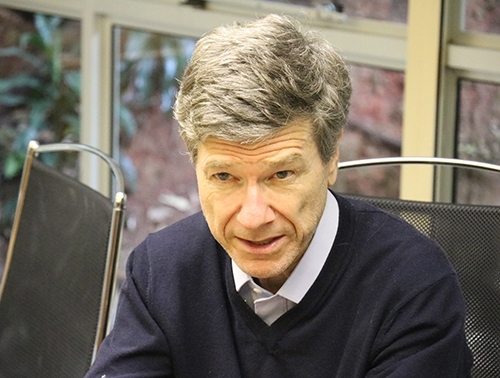

US economist stresses role of engineers and importance of universities and research institutions in pursuing sustainable development (photo: Felipe Maeda / Agência FAPESP)
US economist stresses role of engineers and importance of universities and research institutions in pursuing sustainable development. Watch video of Sachs’s talk at FAPESP.
US economist stresses role of engineers and importance of universities and research institutions in pursuing sustainable development. Watch video of Sachs’s talk at FAPESP.

US economist stresses role of engineers and importance of universities and research institutions in pursuing sustainable development (photo: Felipe Maeda / Agência FAPESP)
By Maria Fernanda Ziegler | Agência FAPESP – “We need engineers working on sustainable development issues, which are systems problems that have to be addressed with new designs,” said US economist Jeffrey Sachs in a talk delivered at FAPESP’s auditorium in São Paulo, Brazil, on November 17, 2017.
For the renowned Columbia University professor, the road to sustainable development worldwide also requires five major transformations, which will be feasible only with the help of research institutions and universities.
The five major transformations are decarbonization of the energy system; sustainable land use; sustainable cities; quality public services, especially in health and education; and the creation of research institutions for an innovation society.
“Without science, we wouldn’t know what’s happening to us. But we must make a distinction between basic science and applied science. This is why we need engineers. They’re the people who develop things, from technology and tools to software, hardware, ideas or machines. Part of what we need now is engineers who can design a new low-carbon system for energy and water,” he said.
“We need a vision of the challenges posed by sustainable development, not only as an activity that merits market treatment but also as a public good that requires the involvement of governments and philanthropy and that levies higher taxes on companies and rich people so that sustainable agriculture and sustainable energy systems, for example, can be paid for.”
Universities would be the ideal places for these transformations to become reality. “They’re great places to achieve this progress,” Sachs said. “The trouble is that most universities aren’t organized in terms of social problems but in terms of disciplines. That’s good, because part of the success of universities is based on this division, but it’s also necessary for people in different areas to work together in multidisciplinary teams.”
Universities should think about new ways of engaging students not just with lectures and disciplines but also with the development of solutions to high-level problems. “I’d also advise a city like São Paulo to go to its universities and say, ‘Look, we need to achieve the Sustainable Development Goals: what kind of transportation system, energy system, land use system can we design? How do we reduce the inequality between neighborhoods?’ Then, you can develop plans based on this dialogue,” he said.
Sachs has been a key figure in the discussion about sustainable development leadership for decades and is considered one of the drivers of the Millennium Development Goals (MDGs), which preceded the 17 Sustainable Development Goals (SDGs). “They started with 300 proposed goals,” he said. “They eventually pared them down to 17.”
Besides having written several best-selling books, including The End of Poverty (2005) and The Age of Sustainable Development (2015), Sachs is Special Advisor to UN Secretary-General António Guterres and performed the same role for Guterres’s predecessors Kofi Annan and Ban Ki-Moon.
Sachs warned that the world is running the risk of irreversibility. “For example, we’re in the very last stages of losing more than a million species, and they won’t come back, despite Jurassic Park,” he said.
According to Sachs, of the three core pillars of sustainable development – economic, social and environmental – the last is the hardest “because it’s irreversible, and we won’t be able to achieve the other two pillars without it”.
Gilberto Câmara, a member of the steering committee for FAPESP’s Research Program on Global Climate Change (RPGCC), saw Sachs’s address as one more sign that FAPESP is at an important point in its history.
“It’s striking that Sachs accepted our invitation to come here and address an audience in São Paulo, after we’d spoken at the COP21 climate conference in Paris,” Câmara said. “It demonstrates the importance of FAPESP’s activities and our concern to fund sustainable development initiatives.”
Republish
The Agency FAPESP licenses news via Creative Commons (CC-BY-NC-ND) so that they can be republished free of charge and in a simple way by other digital or printed vehicles. Agência FAPESP must be credited as the source of the content being republished and the name of the reporter (if any) must be attributed. Using the HMTL button below allows compliance with these rules, detailed in Digital Republishing Policy FAPESP.





